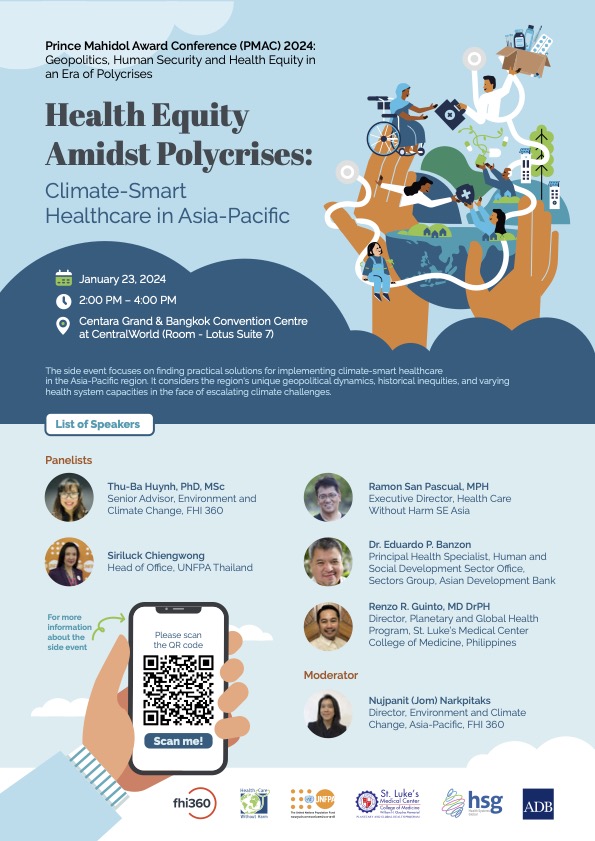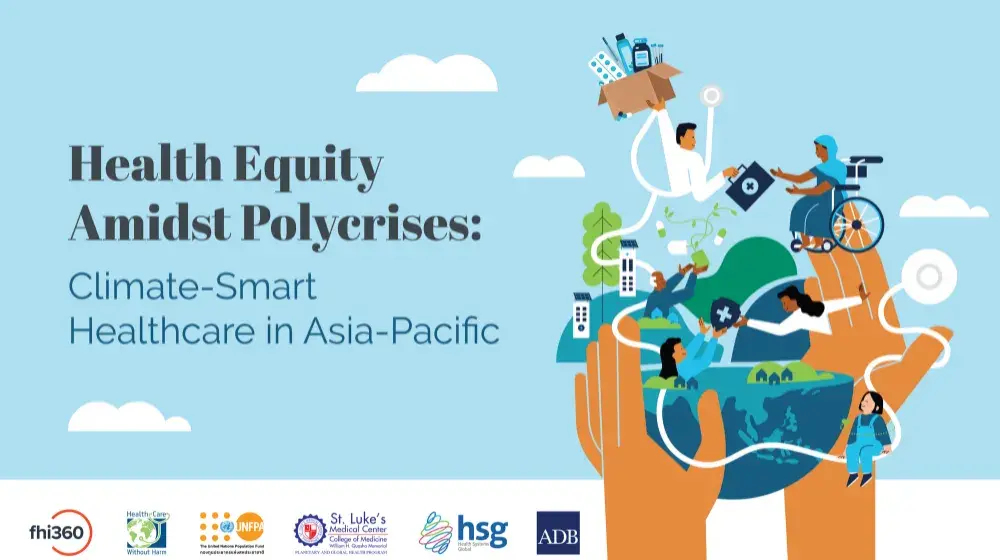PMAC 2024 Side Meeting
Topic: Health Equity Amidst Polycrises: Climate-Smart Healthcare in Asia-Pacific
23 January 2024, 2:00-4:00 PM (Bangkok)
Centara Grand & Bangkok Convention Centre at Central World (Room - Lotus Suite 7)
Co-Organizers:
FHI 360, Asian Development Bank (ADB), Healthcare Without Harm, Southeast Asia,
UNFPA Thailand, St. Luke’s Medical Center College of Medicine, and Health Systems Global
Background
Climate change stands as an urgent and far-reaching global challenge that significantly impacts public health. Particularly in the Asia-Pacific region, its impact on the health sector is profound, bearing heavily on the well-being of vulnerable and marginalized communities. This nexus of climate and health is tightly interwoven with geopolitical factors that significantly shape the disproportionate impacts and responses felt by communities in the region.
Historically marginalized and exploited communities in the Asia-Pacific, often a consequence of colonialism or imperialism, disproportionately face health risks. Addressing these disparities necessitates a response that considers these historical contexts and deep-seated power inequalities embedded within geopolitical structures. Access to healthcare during climate-induced crises is also deeply entangled with geopolitical dynamics. Contested territories, conflict zones, or isolated regions face immense challenges in increasing quality healthcare, exacerbating existing health inequities. Moreover, the concept of health equity encompasses ensuring the participation of all communities, particularly those most vulnerable, in decision-making processes. However, geopolitical dynamics at times suppress these voices hindering the development and implementation of comprehensive and inclusive policies.
Climate-smart healthcare is an approach that aims to reduce the sector's impact on the environment and to build resilience to the health impacts of climate change. Several frameworks have been developed to guide the implementation of climate-smart healthcare; however, many of these rarely acknowledge the geopolitical dynamics that exacerbates prevailing inequities, that half of the world does not have access to essential health services, and that over 100 million people are pushed into poverty annually because of health expenses. Further, a large number of health facilities are not connected to reliable energy and water sources and are in a perpetual state of stress. When a climate shock strikes, it is not a question of whether fragile health facilities are emitting less greenhouse gases or if they will bounce back or transform, but whether they will continue delivering services during the crisis or ever fully recover.
The detrimental consequences of climate change and the unique context in the region underscore the critical need for the development of climate-smart solutions that integrate these geopolitical intricacies, fostering genuine health equity and resilience in the communities.
This side event aims to dissect this complex interplay and seek evidence-based, practical solutions for climate-smart healthcare implementation in the Asia-Pacific region, considering its unique geopolitical dynamics, historical inequities, and varied health system capacities in the face of escalating climate challenges.
The session will also explore how the healthcare sector in the region can proactively contribute to climate adaptation and mitigation while ensuring the advancement of quality healthcare for all. Specifically, the session aims to:
- Raise awareness on the need for tailored climate-smart healthcare solutions that address the unique geopolitical dynamics in the Asia-Pacific region.
- Share evidence-based approaches and case studies of climate-smart healthcare interventions that consider geopolitical intricacies and address issues of health equity for all groups of people, especially the vulnerable populations in the region.
- Facilitate a dialogue among stakeholders to identify opportunities to bolster the scope and impact of climate-smart healthcare initiatives, considering the distinctive geopolitical and health equity dynamics prevalent within the region.
Contact Person : Thu Ba Huynh, tba@fhi360.org
For more information: https://pmac2024.com/activity/33/sidemeetingOnsite/detail



